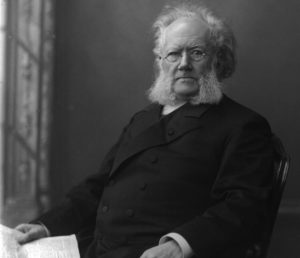LVL CHECKS OUT A DOLL’S HOUSE AT HOPE STREET THEATRE!
Christmas returned briefly to Hope Street Theatre this week when Liverpool’s newest performance space was transformed into the Helmer household for Liverpool Network Theatre’s staging of ‘A Doll’s House’. Ibsen’s classic Christmas tale of relationships, secrets and power, first performed in Copenhagen in 1879, sheds an unremitting light on the pressures and control exerted on women in a man’s world, promising an interesting opener for 2019 and a timely production not least given the recent public discourse about the treatment of women surrounding the #MeToo movement.
Objectified and infantilised by the world around her, Nora Helmer, played by Jessica Martin, is a married mum of two in a comfortable middle-class existence, busily getting her home set up for the perfect Christmas when her world comes crashing down around her. Having taken a secret loan to pay her husband’s medical bills from an admirer, Krogstad, she has spent years paying it back surreptitiously while her husband Torvald, played by Greg Vicary, has been steadily rising through the ranks at the bank where he works.

When he is promoted to manager, he decides to lay off one of the staff, who turns out to be Krogstad (Alexander Davies). Incensed and increasingly desperate, Krogstad threatens Nora with revealing her secret and his discovery that she had forged her dad’s signature on the loan agreement, unless, that is, she can persuade her husband to keep him on at the bank. As Nora tries to figure a way out her situation, aided by her friend Christina (Faye Christiansen) who happens to be Krogstad’s secret ex-lover, there follows an excruciatingly tense and increasingly panicked series of events centring around the Christmas festivities and the Tarantella dance she is due to perform.
At one point, to distract her husband from an incriminating letter in the post from Krogstadt, she sets about a frantic, frenetic rendition of the dance, leading Torvald to scold her for dancing as if her life depended on it, which for her it did. The situation reaches breaking-point after the party when Torvald finds out about the loan and the fraud. He turns on and attacks his wife, threatening to keep her from her children and disowning her.

When he discovers that Krogstad has cancelled the loan, having been reunited with Christina and regretting his actions, Torvald quickly changes course, insisting everything can go back to normal after all, but it is too late – Nora has made a decision to leave behind her doll’s house, her husband and kids. ‘I’ve gone from being a doll-child to a doll-wife’ she cries out in a powerfully performed final scene. She can take no more and Torvald calls out in vain as the door slams shut behind her.
A Doll’s House was apparently based on a true story, the life of a Danish author, who took out a secret loan to protect her husband and found herself struggling with the repayments. Having asked Ibsen for help publishing a book but being knocked back by him she ends up writing a fake cheque instead to cover the debt. When the truth comes out and her secret is revealed, her husband divorces her and she is sent to an asylum. Remarkably, a few years later, she returned to live with her husband and kids, and later on became a successful writer in Denmark.

In the hands of director Donna Day, the Helmer household is transported into the present time. Props are used in a curious way – two dolls, centre stage throughout, representing Nora’s children and ultimately herself, serve as an ongoing reminder of the unreality of the world in which she is trapped. Yet many other items; papers, letters and other simple objects, are mimed, creating little snippets of reminders perhaps of the contrived world in which we as audience were also immersed. Nora fusses and preens her way around the stage, growing ever more agitated and manic as the saga wears on, yet flicks a switch when her husband walks in to project an image of domestic bliss, a facade she finds increasingly difficult to maintain.
Jessica Martin put on a mesmerising performance as Nora. On stage nearly the whole way through the play, she kept up a high-energy intensity and emotional complexity that dominated and defined the production. The rest of the cast of eight were also fantastic and included Oliver Barden as Dr. Ranke, a rich and terminally-ill family friend who is secretly in love with Nora, Julie Hills as the pragmatic and compliant children’s nanny Anna, who had to give up her own child to work as Nora’s nanny, plus Sarah Jones and Jake Angerer, who took on multiple roles, including playing the children and servants.

Liverpool Network Theatre is a non-professional theatre company that stages several shows a year and also runs community drama workshops, making theatre ‘accessible to ordinary people’. Their version of Ibsen’s play made for an interesting and thought-provoking production, providing a skillfully-executed reminder that the doll’s house that ensnares us into its facile world of control and objectification is never far from many women’s experiences still to this day. With ‘A Doll’s House’ creating such an intriguing start to the year and with much more in store from this burgeoning theatre hub, it’s certainly well worth keeping an eye out for what else is lined up for 2019 at the Hope Street Theatre!
For more at Hope Street Theatre CLICK HERE
For more about Liverpool Network Theatre CLICK HERE
Images courtesy of Saoirse Crean and Hope Street Theatre.

